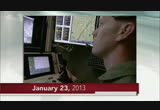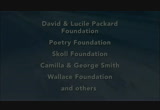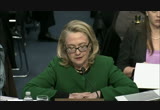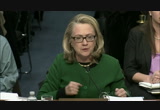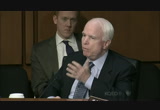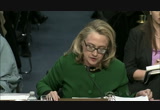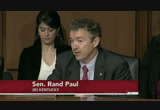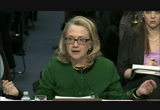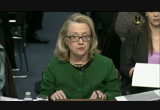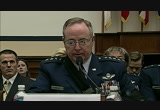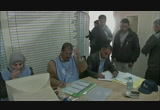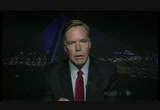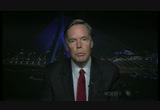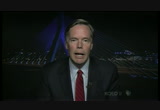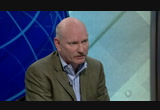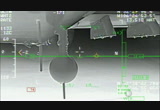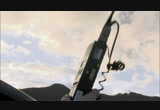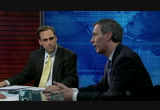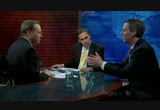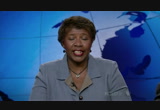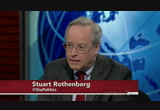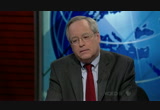tv PBS News Hour PBS January 23, 2013 3:00pm-4:00pm PST
3:00 pm
>> our mind tries to put it in terms of robot or human? but the reality is a mix. >> brown: we close with politics and a look at the way forward for the republican party, beginning with today's house vote to extend the nation's debt limit for three months. >> ifill: that's all ahead on tonight's "newshour." >> major funding for the pbs newshour has been provided by: >> and with the ongoing support of these institutions and foundations. and... >> this program was made possible by the corporation for public broadcasting. and by contributions to your pbs station from viewers like you. thank you.
3:01 pm
>> ifill: secretary of state hillary clinton testified for the first time today about last september's deadly attack on the u.s. consulate in benghazi, libya. her testimony before senate and house committees was at times tense and even emotional. >> as i have said many times, i take responsibility, and nobody is more committed to getting this right. i am determined to leave the state department and our country safer, stronger and more secure. >> ifill: from the start, secretary clinton made clear she accepts ultimate blame for security failings before the attack that killed ambassador christopher stephens and three other americans. she told a senate hearing this morning, it's not just about policy, it's personal. >> i stood next to president obama as the marines carried those flag-draped caskets off the plane at andrews. i put my arms around the mothers
3:02 pm
and fathers, the sisters and brothers, the sons and daughters, and the wives left alone to raise their children. >> ifill: but sparks flew when senate republicans accused the obama administration of deceiving the nation by initially suggesting the benghazi attack was something other than terrorism. senator ron johnson of wisconsin: >> we were misled that there were supposedly protests and then something sprang out of that, an assault sprang out of that. and that was easily ascertained that that was not the fact... >> but could-- but, you know... >> ...and the american people could have known that within days, and they didn't know that. >> and-- with all due respect, the fact is we had four dead americans. >> i understand. >> was it because of a protest, or was it because of guys out for a walk one night who decided they'd go kill some americans? what difference, at this point, does it make? it is our job to figure out what happened and do everything we can to prevent it from ever happening again, senator. now, honestly, i will do my best to answer your questions about this.
3:03 pm
but the fact is that people were trying in real time to get to the best information. >> ifill: republican john mccain pressed clinton on why u.s. consular staff evacuated from libya to germany weren't questioned sooner. >> i categorically reject your answer to senator johnson about, well, we didn't ask these survivors, who were flown to ramstein the next day, that they-- that this was not a spontaneous demonstration. to say that it's because an investigation was going on-- the american people deserve to know answers, and they certainly don't deserve false answers. so here we are, four months later, and we still don't have the basic information. now, if you want to go out and tell the american people what happened, you should at least have interviewed the people who were there instead of saying, no, we couldn't talk to them
3:04 pm
because an f.b.i. investigation was going on. >> well, senator, i understand your very strong feelings. you knew chris. you were a friend of chris. you were one of the staunchest supporters of the efforts to dislodge qaddafi and try to give the libyan people a chance. and we just have a disagreement. we have a disagreement about what did happen and when it happened with respect to explaining the sequence of events. we did get to talk to the d.s. agents when they got back to this country. we did so. it was not before september 15. we had no access to the surveillance cameras for weeks, which helped to answer a number of questions. >> ifill: the challenges continued later in the day before the house foreign affairs committee. >> over and over and over again it was repeated that we had enraged the islamic terrorists, which by the way, what's that
3:05 pm
do? when you say that we enraged the islamic terrorists, that's means we're at fault, they're not at fault. >> i want to be clear that of course it was a terrorist attack. the very next day i called it an attack by heavily armed militants on our compound. i think there is still however questions about exactly what caused it, who the attackers were. >> ifill: in the senate, kentucky republican rand paul said clinton, who is leaving office shortly, should have been fired first. >> i'm glad that you're accepting responsibility. i think that ultimately, with your leaving, you accept the culpability for the worst tragedy since 9/11. and i really mean that. had i been president at the time and i found that you did not read the cables from benghazi, you did not read the cables from ambassador stevens, i would have relieved you of your post. i think it's inexcusable. >> ifill: democrat dick durbin
3:06 pm
of illinois accused republicans of applying a double standard. >> i do want to make one point for the record here about whether the american people are told everything right away, in the right way, so that they can be fully informed. and i'd like to refer to five words for them to reflect on: iraqi weapons of mass destruction. we were told by every level of government here there were iraqi weapons of mass destruction that justified a war, the invasion of the united states. we are still searching for those weapons. they didn't exist. thousands of americans lost their lives. we could have a hearing on that if you'd like. >> ifill: while the benghazi attack was the main focus, secretary clinton also turned her attention to upheaval elsewhere in north africa. >> benghazi did not happen in a vacuum. the arab revolutions have
3:07 pm
scrambled power dynamics and shattered security forces across the region. instability in mali has created an expanding safe haven for terrorists who look to extend their influence and plot further attacks of the kind we saw just last week in algeria. >> ifill: in mali, elements of al qaeda in the islamic maghreb, known as a.q.i.m., have seized a large swath of territory, prompting france to intervene militarily with air power and ground troops. the u.s. military is providing transport flights to aid the french, and clinton said other assistance is under consideration. >> it is a necessary struggle. we cannot permit northern mali to become a safe haven. people say to me all the time, well, a.q.i.m. hasn't attacked the united states. well, before 9/11, 2011, we hadn't been attacked on our homeland since, i guess, the war of 1812 and pearl harbor.
3:08 pm
so you can't say, well, because they haven't done something, they're not going to do it. this is not only a terrorist syndicate; it is a criminal enterprise. >> ifill: the secretary also said the recent crisis at a natural gas plant in algeria is more evidence of the growing threat of a.q.i.m. islamist militants seized the site last week, and the algerian military struck back. the algerian government says at least 37 foreign hostages were killed, including three americans. clinton acknowledged many questions remain about that incident. >> let me offer our deepest condolences to the families of the americans and all the people from many nations who were killed and injured in that recent hostage crisis. we are in close touch with the government of algeria. we stand ready to provide assistance. we are seeking to gain a fuller understanding of what took place so we can work together with algerians and others to prevent
3:09 pm
such terrorist attacks in the future. >> ifill: clinton is expected to be back before the senate foreign relations committee tomorrow, to introduce her likely successor, senator john kerry. >> brown: online you can watch some of the more heated exchanges from the hearing, as well as read the full testimony transcript. still to come on the "newshour": the emergence of africa for u.s. policy-makers; combat roles for women in the military; the robotic planes known as drones and the way forward for the g.o.p. but first, the other news of the day. here's hari sreenivasan. >> sreenivasan: an arctic storm system kept its grip on the midwest and northeast today. sub-zero temperatures spanned a large swath of the nation, from the upper midwest into new england, and 15 states were under wind chill warnings. fierce winds have blown across the great lakes for days, dumping more than a foot of snow on ohio, pennsylvania and new york. the deep freeze is forecast to stick around through the weekend. marine general john allen is back on track to become supreme commander of nato forces in europe. white house officials said today his nomination is no longer on
3:10 pm
hold. that's after the pentagon inspector general cleared allen of any wrongdoing in e-mail exchanges with a tampa, florida woman. allen steps down as overall coalition commander in afghanistan next month. the air force's top general vowed today to put an end to sexual misconduct within the service. figures for 2012 show some 800 reported incidents. many of the cases stemmed from a scandal at lackland air force base near san antonio. an investigation there found 32 instructors allegedly engaged in sexual misconduct with nearly 60 female service members. at a house hearing, the air force chief of staff general mark welsh called the numbers appalling. >> there is no way we can allow this to happen again. the air force goal for sexual assault is not simply to lower the number. the goal is zero. it's the only acceptable objective. the impact on every victim, their family, their friends, the other people in their unit is heartwrenching. and attacking this cancer is a full-time job and we are giving
3:11 pm
it our full attention. so far, six training instructors from lackland have been convicted on charges ranging from adultery to rape. nine others are facing courts- martial. 15 more instructors are still under investigation. israeli prime minister benjamin netanyahu began trying today to form a new governing coalition, after a weaker-than-expected showing in tuesday's elections. near-final totals showed his bloc and its allies had only 60 of 120 seats in parliament. netanyahu signaled he'll reach out to a new centrist party that made a strong showing. it favors a new focus on making peace with the palestinians. this was election day in jordan. voters cast ballots in the country's first parliamentary elections since the arab spring. the new legislature will have more power, including the ability to choose the next prime minister. some two million people were eligible to go to the polls. turnout estimates varied from a high of 56% to as low as 47% as the day went on. several islamist groups boycotted, saying the election was stacked against them.
3:12 pm
but the prime minister dismissed their actions. >> ( translated ): the weakness of the turnout, if it exists, and i am not saying that, nobody should think that it is because of the boycott. it is not correct. otherwise anyone would think if there was any hesitation for the elections it's because people were neither convinced with past elections nor with the performance of the past parliament. and they are fed up. >> sreenivasan: european election observers were stationed across the country. but no major rules violations were reported. a suicide bomber in northern iraq killed at least 25 people at a shi-ite funeral today. among those hurt were a number of provincial officials who had been attending the service. the bombing today was the latest in a series of recent attacks, amid rising sunni-shi-ite tensions. the suicide of a former pro football star became the focus of a wrongful death lawsuit today, against the national football league. the family of junior seau claimed his death was the direct result of a brain disease, caused by blows to the head during his playing days. seau retired in 2009, and committed suicide last may at the age of 43. posthumous tests showed that he
3:13 pm
suffered from c.t.e., a degenerative brain illness. the n.f.l. already faces scores of suits over player concussions. notre dame star linebacker manti te'o now says he kept saying he'd had an online girlfriend, after learning she did not exist. in an interview, te'o told abc's katie couric that he thought lennay kekua had died in september. instead, he said, he found out it was all a hoax, just days before the heisman trophy announcement. >> katie, put yourself in my situation. this girl, who i committed myself to, died on september 12. now i get a phone call on december 6, saying that she's alive, and then i'm going to be put on national tv two days later, and they ask me about the same questions. you know, what would you do? >> sreenivasan: te'o ultimately did not win the heisman, but he did answer questions about his girlfriend, without ever saying there'd been a hoax. today, he insisted he played no part in the hoax. wall street climbed again today, based partly on strong earnings at google and i.b.m.
3:14 pm
the dow jones industrial average gained nearly 67 points to close at 13,779. the nasdaq rose ten points to close at 3,153. those are some of the day's major stories. now, back to jeff. >> brown: and we pick up on secretary of state clinton's testimony today and issues it raised about benghazi, the growing dangers in africa, and the challenges for u.s foreign policy. the attack on the u.s. consulate we're joined by former u.s. diplomat nicholas burns who served in republican and democratic administrations, he's now with the kennedy school of government and harvard university. and danielle pletka, vice president for foreign and defense studies at the american enterprise institute. with you and start with benghazi. was there more light shed today. where do things stand in terms of understanding what happened and the response to it? >> well, jeffrey, i thought it was a commanding performance by secretary clinton. she was well informed. she was a master of the detail, and all the-- and she took responsibility, which was the right thing to do. she said that she will implement
3:15 pm
all the 29 recommendations of the accountability review board. now, i think the republicans there obviously had a right-- and i think they had an obligation to ask tough questions because this was a disaster for the american foreign service to lose four people in one day, including ambassador chris stevens. but i must say just watching it this morning and it went on this afternoon in the house of representatives, there were elements of partisanship that we really don't need any more. it's almost as if we've been transported back to september and october and the presidential campaign, and certainly the remarks will of senator rand paul were ugly. and they were very unwise to accuse secretary clinton of you can pability in the way that he did. i think we've got to move forward, jeffrey. there are two big issues. one is how do we protect our diplomats going forward. and part of that answer is for the state department to learn the lessons of what happened, what went wrong. part of it is for congress to fully fund embassy security.
3:16 pm
congress denied the state department $340 million it needed last year 2000 to fortify our embassies. and the second-- brown: let me stop you there. let me get danielle pletka in. first, what do you think of what unfolded today with secretary clinton? >> well, i think nick was right. the secretary has, obviously, got a great command of the facts. she's a good speaker. she's authoritative. and she was a member of congress. but it really was a lot of sound and fury sig niifying not very much. she didn't really answer questions about what happened in the run-up to the attack, why our response wasn't better, and all of these efforts to direct us to move forward and to learn these lessons really failed to understand that the way we move forward is by acknowledging exactly what went wrong. just saying "i take responsibility" is admirable and sounds gutsy but it doesn't really mean you're taking
3:17 pm
responsibility glowr what about what mick today. there's been this review. there are many recommendations and what she's saying, since that's the way to move forward is to implement it and learn from what happened. >> well, it's a very washington perspective. you know, we have our mr. ribbon commission. the truth is what happened, and the reason this became a scandal is not just because of the absolutely dreadful murder by terrorists of four people serve, their country. it was because the white house and the state department and many others insisted for a full week after the attack that occurred on september 11 that it was the responsibility of a film. and the response to a film, and not a terrorist attack. the american people, not the congress, not the secretary, they deserve answers, and those answers really haven't been forth coming and they were not on show today. >> brown: well, nick burns, respond to that, but also try to
3:18 pm
move this into the larger picture. the other part of what she was talking about of course today was the other parts of-- what's unfolding in north africa and how do we move forward? >> well, jeffrey, i just say that secretary clinton does have 29 specific recommendations before her by a very serious panel, and she's in the middle of implementing all of them. i think that's the right thing for her to do. and, therefore, i did think she dealt directly with the questions that were asked today. there's a much larger issue here. and we're witnessing the two years into the arab revolutions, and the arab revolutions are entering a new and dangerous phase and we're seeing it in north africa in this part of the world with the terrorist attack and00 taking in algeria of last week, with the destabilization of libya, and in some ways, egypt itself. and you're seeing now a radical terrorist group, islamic terrorist group taking over the northern part of mali. this has consequences of the entire region, which extends from mortanya, mali, the
3:19 pm
southern parts of libya and tunisia and algeria. it's very important for american interests that we respond to this and go after those terrorists. and thank goodness for the french who have now taken up the lead with a lot of countries supporting them, by the way, to try to stop this greep grooup. it's very important that we meet this challenge. >> brown: so danielle pletka, does your critique of benghazi extend to what is unfolding now when you see the administration responding or not responding? >> not responding is the answer. i think benghazi was merely a symptom of a larger policy of retreat, of unwillingness to deal with the challenges that we're facing from al qaeda. because it's not just in the mag reb. it's not just in libya and male and algeria. it's in yemen, it's in sinai. it's in iraq. it's of course in--
3:20 pm
>> brown: in what ways do you see us rings, specifically in the north africa? >> i think it's nice that nick said we should thank the french, and absolute the french have interests in mali as well. apparently the administration is really struggling right now how much support to provide to the french, not on the ground but the question of refueling their flights. if we're not willing to do that it begs the question of howing whether we will be to step up to the challenge in the mag reb. >> brown: you see a pullback? >> i think it is the signal we got from the president and in libya. the subcontracting of arming the forces in libya that were fiels the gaddafi to gulf countries meant that arms flowed not to people who we chose, not to people who nato chose but to people who were chosen by gulf countries. that's one of the reasons we have this terrible blow-back. >> brown: nick burns, that's larger question and we're at the beginningave new administration,
3:21 pm
we heard the inaugural speech the other day, do you see the administration somehow pulling back from the easiests, particularly in africa? >> no, i don't at all. i think that's unfair criticism. first, the president has appointed both senator john kerry and chuck hagel, internationalists, capable people who really know what they're talking about. second, the administration began lifting by c-17 aircraft french soldier swoz maulo monday. we're providing logistical and intelligence support. and third the administration i think has done very well in engaging egypt. and as we talk, jeffrey, about the stability of the middle east, egypt is the keystone country and a lot is going wrong in egypt but a lot is going right. elected government has kept the peace agreements, the camp david accords with israel and has a working relationship with the united states. i'm worried about a lot of these trends in the middle east-- we haven't even talked about the civil war? syria-- but i do think the
3:22 pm
administration is focused on this. the president has a working relationship with president mohammed morsi. israel has to meet a lot of these tests. they'll need american support. and i think we are seeing an engaged, sophisticate administration at work. >> brown: all this, of course, danielle pletka, goes to the sort of continuing fallout from the arab spring. all of these countries that nick burns just talked about and the management of that. >> and that's reality challenge. i mean, these are the questions. you know all of these sort of bureaucratic ideals -- hes had a relationship, we're maintaining this, we had a panel, we're following recommendations -- this is really about the national security of the united states and support for our allies in the region. and they're looking to us and what they are seeing is not, gee, we have a great relationship with these people." they're seeing that we're not engaged on the most pressing issues that are of importance to them, whether it's the iranian nuclear problem, it is the spillover from what is happening in syria. it's 80,000 people dead in syria. we have genuine threats that
3:23 pm
we're facing and we're not managing it by having a good diplomatic relationship with these people. we are not dealing with it. and we are going to pay. >> brown: danielle pletka and nicholas burns, thank you both very much. >> thank you. >> ifill: now, two stories about the military. the pentagon confirmed today that defense secretary leon panetta has decided to lift the armed services' ban on woman serving in combat. that announcement, which will come tomorrow, could open up thousands of front-line jobs to women and it reverses a 1994 policy that kept women out of those positions. for more on what would be an historic change, i'm joined by james kitfield of the "national journal." what has been-- has this been in the works for a while, james. >> a couple of years inge within last year, they opened up 14,000 additional jobs. so they've been thinking about
3:24 pm
this. you know, wars are great levelers. anyone who spent time in iraq or afghanistan knows that women are on the tip of the spear. there are no front lines in these counter-insurgency wars. if you're a logistic battalion that has women in it, and during the iraq invasion there was one that got captured that had women in it. there was artillery battalions led by female colonels during the invasion. those artillery units ended up being foot patrols -- >> ifill: it sounds like you're saying this is a difference without a distinction. >> i'm saying wars have a way of making some of these distinctions meaningless. women have been in combat, quite honestly. and men have seen they can hold up their own, and women hoput their lives on the line, in some cases more than 100 have paid the ultimate sacrifice, women are not willing to go through that and say, "you're not allowed this promotion because you can't be in a combat unit." "hey, i've been in combat the last few years." the irfairness comes to the
3:25 pm
fore. >> ifill: there is a loophole, allowing individual services to decide where it makes sense and where it doesn't. there must be place where's the parameters of debate are based on what women can and where they cannot be. >> i think that's true, and i think by defaulting to no ban at all it was probably pretty clever on his part because he knows there are going to be some exceptions carved out. the services have three years to do it. think special forces, the guys who knock down the doors and shoot people. there are a lot of strength issues and that kind of thing involved in that. i would think that wouldn't most obvious place. the marine corps may have a slightly more difficult time than the army because it has the ethos of a few good men. but in general, he's saying you have to-- you know, the oans is on you to tell me why they can't serve here, prove to me they can't do this job rather than the way it was where women had to say, "well, i should be able to do this job. i have strength.
3:26 pm
i have stamina." so i think the onus is now on the services to really think hard about where you can justify not having limits. >> ifill: assume for a moment the draft was to be reinstated. does that change peopleee minds about the number of women who are affected. right now it's voluntary. but that would be different, wouldn't it? >> of course there would. it's not going to happen politically. if of but if there was a draft, clearly if the military opened up all those roles to women, you would think the draft would include women. >> ifill: here's the other question, today we ?aw testimony on capitol hill, that the air force admitted there has been a great rise in the number of sexual assaults, at least in some training bases. is this something what has been part of the concern as well? >> it is. i was at lackland and i covered that story. the military has a huge sexual abuse problem.
3:27 pm
19,000 service members each year report they're victims of sexual abuse and they had a very hard time getting their hand around it. you heard the testimony today called a cancer. secretary panetta has called it an invisible cancer, an invisible epidemic. this is not unlike what we saw in the persian gulf war, women served in combat, some died, and there was the tail hook scandal, and this is an all-male, testosterone-driven ethos, and we are going to open up other positions to women. i suspect secretary panetta in thinking about this had two data point. one is he's got the sexual abuse problem pain lot of them disproportionately toward women, these attacks. and he thinks the ethos of the services may be somewhat the cause of that. secondly, he looks at gays in the military. they've gone through a decade of don't ask, don't tell. lifted the ban on gays openly
3:28 pm
serving in the military and the response from the rank and file was a collective shrug. i don't think they care anymore. they understand after a decade of war, these people are watching each other's backs. there is not going to be a huge amount of blowback from the rank and file. they know these things are not important. what is important can these people have my back in a war zone? they've prove than they can. the rest of it kind of goes away. >> ifill: does that mean as secretary panetta leaves and goes back to the walnut farm as he describes is, does this mean he leaves a legacy opening up the armed forces. >> he's probably thinks this is a legacy burning move-- >> ifill: gays in the military, women in the military. >> the trend lines are clear on both of those social barriers. again, a deckated of war has made things possible that are not possible before and i think they're capitalizing on them. >> ifill: is there any way to quantify how many women will be affected by the lifting of this ban. >> it's hard to say. we don't know the services they
3:29 pm
will cut out that women can serve in. if you take out special forces, the very tip of the spear, you could open up hundreds of thousands of jobs to women in ground combat units. and all the major 10 divisions in the army who do ground combat there's no reason to say women can't serve in those. >> ifill: there has been just a few hours but has there been push-back from members will of the military or capitol hill >> joint chiefs support this. there will be some push-back from the hill. the question is how much? my reading of it is the momentum is clearly with those who would open up these jobs to women. i think it will be a rear guard action of a few really social conservatives saying women are not suited for these things but i don't expect it will get in the way of implementing this policy. >> ifill: james kitfield of "national journal" thanks a lot. >> brown: and to our second story about the military: the
3:30 pm
turn to drone warfare in the hunt for terrorists. tonight's edition of "nova" explores this sophisticated technology, its uses and the controversy it's stirred. this excerpt shows a u.s. military training exercise for those charged with directing drones to track and hit their targets. >> training mission offers a rare glimpse into the mechanics of how the u.s. use drones to support troops and prosecute its war on terror. the goal is to make it as realistic as possible so pilots can avoid mistakes when in battle. >> they should be check here, probably in the next 20 minutes or so. >> it's going to be an f-29 reaper. >> check. >> 25,000 feet, where they generally work, we're not going to be able to see them at all troarpt tbaiks half an hour to reach the mock village. drones like the reaper can fly on their own using autopilot and preset g.p.s. locations. but the air force still keeps human hands on the controls at all times.
3:31 pm
>> people have this concept of either it's a manned plane and the pilot's doing everything on, or it's an unmanned plane and it's something out of the "terminator" movies. the reality is it's in the middle right now for both the manned and the unmanned planes. our mind tries to put it nerms of robot or human? but the reality is a mix. >> reporter: as chad pilots the reaper, his sensor operator, jay, controls the cameras and lasers. on the ground, the fake insurgents enter the village as the reaper hovers miles booch. >> 2-0, say status. >> we have eyes on the target. >> reporter: chad gets direction from the soldier, whose handheld receiver and computer allow him to see what chad sees. chad's call sign is "bones." the soldier goes by "really."
3:32 pm
>> really, bones, we have two moving around inside the northwest corner of the compound. >> reporter: the soldier directs chad and jay to follow an hvi, or high-value individual, dressed in black. >> looks like the one individual wearing black is now getting on the motorcycle and departing the group. >> reporter: depending on the situation, the decision to kill comes from an intelligence officer who could be anywhere, a battle commander on the ground, or sometimes the pilot. >> brown: since the obama administration came to power four years ago, the united states has vastly increased the number of drone strikes against suspected terrorists just today, reuters reported that six suspected al qaeda militants were killed in yemen. but their use has been highly controversial, on a number of levels and we move to that debate now, with seth jones, who worked for the commander of u.s. special forces in afghanistan
3:33 pm
from 2009 to 2011 and is now a senior political scientist at the rand corporation. and chris anders, senior legislative council at the american civil liberties union. the a.c.l.u. has filed law-suits against the government challenging the legal basis for the drone program. welcome to both of you. i want to start, seth, with the effectiveness question. how effective are drones strikes? >> i think on the one hand, drones have been effective in taking off the battle field several individuals that have been actively involved in plotting attacks against the u.s. homeland. all of them plotting active attacks and the drone strikes severely disrupted those attacks. i would also say, though, that they are not sufficient. strikes in and of themselves don't hold territory. they don't deal with the root causes of terrorism. so one should never argue-- or it would be incorrect to argue that they are sufficient to
3:34 pm
ending how terrorist dwriewps operate orinding terrorism. >> brown: do you dispute the effectiveness in taking out some of the top leaders? >> the truth is that no one really knows exactly what's going on with their effectiveness or not because this is a program that has been wrapped in secrecy. every aspect of this program is secret, so secret, in fact, even members of senate intelligence exphity, they're supposed to be overseeing this program, are not able to see even the legal justification for the program. what we do know is that there have been over 300 strikes. there-- drone strikes. there are over 3,000 people who have died. most are far from any traditional battle field. so we can point to some people that the administration has selectively leaked as successes, but what we don't know are the failures. >> brown: and one of the questions among those killed of course has the number of civilians, the unintended casualties. how much do we been that? >> well, the data is not really
3:35 pm
that good on civilian casualties. it would be helpful to get a more transparent assessment of civilian approaches. i have talked tie range of human rights organizations in pakistan's tribal areas who have argued from their perspective on the ground, civilian casualties are rather minimal. but other than some sporadic conversations i've had with people in the tribal areas, i think the data we have publicly is limited. >> brown: what does your data show, or people you talk to show? >> two things. one is tomorrow the united nations is going to announce it's appointing a special investigator into civilian deaths by drones, and through this targeted killing program. so we should be able to get some of the real facts through this u.n. investigation. it's ridiculous that the united states itself hasn't conducted this kind of investigation. of or disclose its results. but that investigation will be done by the u.n. the second thing is general mcchrystal just earlier this
3:36 pm
month talks of talked about the drone program and how-- how th the-- the attacks on civilians and the civilian casualties are cause, what he calls a vis viseral reaction of hatred in the affected countries, the very people we're trying to win over to our side. >> brown: that's been one of the issues of course, is are we make more enemies than killing enemies by doing this? >> well, my experience in particular in pakistan where most of these have happened is most pack takens are upset not that drones are being used but more apset that the pakistan government isn't using them. they're upset that the u.s. is doing them in pakistan's territory. that is often more of the issue than the drones themselves. >> brown: you don't see it as creating, you know, unintended blowback because of-- i think that's the argument is that these drone attacks create a kind of unintended consequence of more people angry at us. >> i think there always is a danger of over-using them. again, i think there have been several cases, ones i'm aware of
3:37 pm
which have disrupted people active involved in plotting. but i would also say why pack takens, for example are, unhappy with the americans. it's complicated. there are a raifnl of factors. it's not just drones. there have been a range of issues including the raid against bin laden that did so. >> announcer: is there evidence of more direct evidence that there is that kind of blow-back that you think is happening? >> well look i spend a lot of time lobbying congress and members of the hous house and se armed services committee. there is a lot of worries there, especially about the c.i.a. program and the possibility of repercussions and reprisals against american soldiers in these parts of the world and also the c.i.a. in particular pulling the united states into conflicts that will be very difficult to get out of. that's why, especially as you start looking into places like north africa, mali, mauritania, some other places now being discussed as possible other places for drones to be used. there's a lot of worry in the
3:38 pm
military about whether we get sucked into that through drones and kind of easy, addictive tool, whether it's going to end up costing the united states a possible, you know, years-long, decade-long conflict there. >> brown: what's the nut of the legal issue, want legal case against the use of drones? >> well, the question-- every country has a right to defend itself. and defend itself against imminent, concrete, specific attacks that could cause death. even if those are away from the battlefield. but what we don't know here is exactly how these rules are being applied. now we know that the "washington post" just reported over the weekend that there's a secret playbook that's being developed by the obama administration, but from that playbook, the c.i.a. program in pakistan, which is the biggest player in this whole thing, is entirely exempt. so you have a secret playbook on what the rules are, but the
3:39 pm
rules don't apply to the biggest player. to say "we follow the rule of law, "when we don't even know what the rules are, and the rules don't apply to the biggest player is a little bit of a joke, i guess. >> brown: what do you think about the legal issue here? >> well, the legal issue in part hinges on the 2001 thanks, of the use of military force. it's worth noting both republican and democrat attorneys general since the bush administration into the obama administration have argued that it is legal in terms of self-defense purposes to target individuals actively threatening the united states. and-- >> brown: in other countries. >> in other countries. >> brown: without declared wars. >> yes-- well, that's part of the issue here. we have an ongoing conflict with a terrorist organization that has declared jihad or war against the united states. >> what we don't know is we don't know to what extent this administration is relying on the
3:40 pm
2001 report or nothing at all. the legal opinion drafted by the justice department now a couple of years ago has been so tightly held, that even senator widen, the number three ranking member of the senate intelligence committee-- which is supposed to have oversight-- is not allowed to see the opinion. and then the courts themselves are is not applying due process. they've declined to take want cases, the challenges to the program. so it means that there is a completely it's checks and balances that it should be applying don't apply here. we don't have the courts having oversight and we basically have the committees. they're supposed to have oversight over this program be denied basic information on what the laws is. >> brown: the other question that comes up, what happens as other countries get this technology and use it against our allies and potentially against us and try to make the same legal case? >> well, look, i think as we saw with nuclear plif raitionz, that
3:41 pm
at some point, the u.s. has to spearhead an effort to begin to establish legal norms for the use of this, like the nonproliferation treat they dealt with nuclear weapons. at some point, sooner rather than later, the europeans have capabilities. the indians. the chinese. at some point we have to get a better ham on international legal limitations to this. >> brown: seth jones, chris anders, thank you very much. and there's more on our website, where you can read a background report from the council on foreign relations on drones and targeted killings. plus we have a link to pro publica's reporting on what we know and don't know about the unmanned planes. >> ifill: on monday, the president laid out his agenda for his second term in office. today, house republicans took their first step to position themselves for a series of upcoming fiscal battles. on the house floor today, speaker john boehner called the
3:42 pm
republican bill, "pretty simple." >> it says there should be no long term increase in the debt limit until there's a long term plan to deal with the fiscal crisis that faces our country. >> ifill: today, the house opted for short term, temporarily lifting the debt ceiling until may 19, then resetting the cap to cover any borrowing over the current limit-- $16.4 trillion. and for now, republicans will not force immediate spending cuts. the party's new strategy would achieve that goal by forcing congress to pass a budget. house budget committee chair-- and last year's vice presidential nominee-- paul ryan. >> here's the point, we have a law, it's called the budget act, it requires that congress passes a budget by april 15. all we're saying is, "congress, follow the law, do your work, budget. and the reason for this extension is so we can have the
3:43 pm
debate we need to have." >> ifill: as added incentive, the house bill says, if there is no budget, then lawmakers won't get paid. after it passed today by a bipartisan vote of 285 to 144, speaker boehner said he's optimistic that will happen. >> if both chambers have a budget. democrat budget from the senate, republican from the house now you've got competing visions, for how we address this problem. out of those competing visions, we're going to find some common ground. >> ifill: but house minority leader nancy pelosi said linking the budget to congressional pay was a ploy, and 11 house democrats ended up opposing it. >> this linkage is a gimmick, is a joke. it's not right. it's designed to put people on the spot and say either you get don't get paid and in order to get paid, for member of congress to get paid, you must cut
3:44 pm
benefits for seniors, and their medicare guarantee, medicaid and the rest. >> ifill: ultimately, the house republican measure is aimed at the democratic controlled senate, which hasn't debated a budget since 2009. but unlike pelosi, senate democrats said they would support the house bill, which they claimed as a victory >> president obama has consistently said he'd refuse to negotiate around the debt ceiling. his strategy is vindicated now that the republicans have backed off their threats to take the nation into a default. the president stared down the republicans. they blinked. >> ifill: congress still faces other fiscal fights. automatic spending cuts are due to kick in on march first, and funding for the government runs out march 27. so, can the republican party use fiscal issues to regain its footing? for more on the political fights ahead we turn to susan page, washington bureau chief for "u.s.a. today." and stuart rothenberg of the "rothenberg political report" and "roll call."
3:45 pm
chuck schumer just said the republicans brinked. did they blink, susan, and does it matter if they did? >> i think a big recalbraigz on their part. they find themselves on the defensive when it comes to the debt ceiling issue. remember how they vowed they would only raise the debt ceiling by a dollar for every dollar cut in spending. now they said never mind. we'll push that down the road. the big fight will be on the sweeping spending cuts that go into effect march 1 and on the government funding that runs out on march 27. march is going to be the month to watch, and it's a month that could end in a government shutdown. >> ifill: is it the kind of fight the republicans want to have to redefine themselveses? >> i think they do. gwen, i think you have to know when to hold them and know when to fold them. yes, the republicans folded on this wise wisely. finally, i think they got some smart on this. you have to pick your fights. they need a breather now. they've been on the defense for a year on tax cuts for
3:46 pm
millionaires, on toughness, shutting down the government, they're not going to compromise. they need to recalbright here, a reset button needs to be pushed and it seems like in every aspect of government. and fight on future spending, not on obligations already incur. >> ifill: in the inaugural address this week, we saw the president lay out his gold for what he wants the next four years-- or the next year at least to be. what is the republican counter to that? >> i think the republicans have recalbrighted their tactics but not their end goals. they're in favor of cutting spending without new revenues. paul ryan this morning said no new revenues. the president has gotten all the revenues he will get. they have doubled down on spending cuts. they say they have a plan that will balance the federal budget in 10 years. you can only do that without revenues if you have really devastating cuts on all kinds of domestic programs and we'll see if they're willing to deliver on
3:47 pm
that. >> ifill: one democrat today and republican paul ryan used the same term today about what's happening when is "they're buying time." >> i think that's right. you know, this is about positioning and symbolism and messaging. i think susan's exactly right. it's not that the republicans are changing their principles here. it's that they've decided they have lost these arguments because of the way they are making their case or not making it and they've been outwitted by the dems. what thipt to talk about the next six months is deficits, debt, spending. and i think this gives themselves a chance to do that. >> ifill: but the possibility of sequestration, these unpopular croos the board tax cuts, i mean, spending cuts, or a government shutdown looming-- i think the term that the democrat dick durbin used was "confrontation fatigue." do they run the risk of confrontation fatigue? >> i think some of the
3:48 pm
republicans danot have confrontation fatigue. i think it energizes them. this is a really conservative group, especially in the house-- they relish confrontation. if you're looking for places where they're modifying their position, on immigration, yes, i think so. we could see a deal there that we have been unable to reach in this town for a decade. i think we're in for a period of pitched warfare like the one we've had over the past year. >> i think for the republicans, you know, they have their own fights but it's not over principal. it's not about where they want the country to go. it's over strategy and tactics. you have the folks at the club for growth and the n.a. tax people and they want to dig in. i think republicans now realize eye don't know if they can carry the day on this-- but i think they now realize a smile, a lighter touch, talking about compromise, but staying tough to principle, repositioning themselves that could do a world of wonder. i think they just need a break
3:49 pm
now. i think they need the focus to be on the white house, the president and the democrats. >> ifill: what they're counting on then you're saying not that the vision will change but the implementation will be so unpopular for the white house they will then be able to regain their footin footing there that? >> in fact, the country is very concerned about spending. they're concerned about these huge deficits and debt. that's an argument that maybe republicans can get some traction on. i thought this was a good day for john boehner who has had a lot of bad days in leading the house. this was a crase where they had a retreat last weekend. people who were there said it was a very som bell retreat and they agreed to back the speaker. that wouldn't seem remarkable except in the past sometimes they have not been willing to do that. >> ifill: here's i guess the big question, when they say they want to reach across the aisle, when they say they want to talk to democrats, they want to engage, is that real? and is it even necessary? >> well, i think-- i think they want to engage as a way-- as part of the process of achieving their ends.
3:50 pm
you know, this day andig, everybody says "let's sit and talk." at the end of the day, wield talk and you agree with me and move on to the next subject and you can agree with me as well. that's the way both parties operate. i think the democrats did it much better the last year. the democrats will got a lot of mileage about attacking the republicans for not compromising, and yet most members of the congress, democratic members, seem willing to go over the fiscal cliff to get what they wanted. at the end it was the white house was unwilling to do that but a lot of people on the hill-- democrats -- happy to go over the edge. >> here's one possibility for the republicans. did president obama over-reach in his inaugural address? i think that was just about the most liberal, or progressive message i've heard him deliver in two terms na term and two elections and a term in the white house. including talking about climate change. which is going to be a very tough battle. and i think some republicans think he did over-reach that he
3:51 pm
now knows he doesn't have to run for another election-- this is something we've seen affect other second-term presidents. that might be a bit of an opening for the g.o.p. >> ifill: what i hear is democrats will saying here are these great sweeping things we can accomplish now and republicans saying here are these incremental accomplishments, notches we can get on our belt month after month after month, kind of a slog. >> i think you're right. i think the president is emboldened and we'll see whether he will over-reach. the problem for the republicans is strategically and tactically they have been out-smart by democrats for an extended period here. and although they now have a breather, a chance to reset and reposition and begin with a new strategy, the democrats are not going to sit quietly and allow themselves to be rolled, the either. somehow they've always been able to be-- over the last couple of years-- a step ahead of the republicans. >> ifill: you mentioned strategy, it's not-- it's not-- it's all going to be fiscal policy. it's not going to be climate change necessarily or immigration or is it? >> i think these next three
3:52 pm
months are going to be all about fiscal policy by necessity. but i think immigration is going to get an early start. we'll see what the state of the union graes, but i think the expectation is it will be immigration. >> ifill: that will be the next big fight. thank you both very much. susan page of "usa today," stuart rothenberg, "political report." >> brown: again, the other major developments of the day: secretary of state hillary clinton told congress she takes responsibility for security failings before a deadly attack on u.s. diplomats in libya. but she rejected republican claims that the administration misled the country about the incident. the pentagon confirmed that defense secretary leon panetta has decided to lift the military's long-standing ban on woman serving in combat. and the bitter cold that's gripped the upper midwest, spread into new england, bringing sub-zero readings and wind chill warnings. and it's called the "dismal science", but online the
3:53 pm
economics jokes are flying. hari sreenivasan explains. >> sreenivasan: we've featured the standup economist yoram bauman on the "newshour" before. you can watch his new routine, "hyperinflation in hell," on our making sense page. and security at monday's inauguration was a major undertaking by some 50 agencies. on art beat, jeff talks to best- selling author brad meltzer, whose novel 'the fifth assassin' draws on some of the real-life issues involved in protecting a president's life. plus, an online event not to miss tomorrow. i'll moderate a discussion with vice president biden and others on president obama's proposals to reduce gun violence. the conversation will be a google-plus hangout at 1:45 p.m. eastern time. you can watch it on our site live and if you have questions for the vice president, you can find a link for submitting them by visiting newshour.pbs.org. gwen? >> ifill: and that's the "newshour" for tonight. on thursday, we'll cover the confirmation hearings for senator john kerry, president obama's pick for the next secretary of state. i'm gwen ifill. >> brown: and i'm jeffrey brown. we'll see you online and again
3:54 pm
here tomorrow evening. thank you and good night. >> major funding for the pbs newshour has been provided by: ♪ ♪ moving our economy for 160 years. bnsf, the engine that connects us. >> support also comes from carnegie corporation of new york, a foundation created to do what andrew carnegie called "real and permanent good." celebrating 100 years of philanthropy at carnegie.org. >> and with the ongoing support
3:55 pm
of these institutions and foundations. and... >> this program was made possible by the corporation for public broadcasting. and by contributions to your pbs station from viewers like you. thank you. captioning sponsored by macneil/lehrer productions captioned by media access group at wgbh access.wgbh.org
3:58 pm
>> this is "bbc world news america." funding for this presentation is made possible by the freeman foundation of new york, stowe, vermont, and honolulu. newman's own foundation. and union bank. >> at union bank, our relationship managers work hard to know your business, offering specialized solutions and capital to help you meet your growth objectives. we offer expertise and tailored solutions for small businesses and major corporations. what can we do for you? >> and now, "bbc world news
3:59 pm
america." >> this is "bbc world news america." u.s. secretary hillary clinton testified, is giving them an earful. >> the fact is, we have four dead americans. is it because of a protest or because some guys went for a walk one night and decided it wanted to kill some americans. what difference does it make? >> benjamin netanyahu hangs on as prime minister, but the coalition is far from certain. and britannia returns home from afghanistan. afghanistan.
307 Views
IN COLLECTIONS
KQED (PBS) Television Archive
Television Archive  Television Archive News Search Service
Television Archive News Search Service 
Uploaded by TV Archive on

 Live Music Archive
Live Music Archive Librivox Free Audio
Librivox Free Audio Metropolitan Museum
Metropolitan Museum Cleveland Museum of Art
Cleveland Museum of Art Internet Arcade
Internet Arcade Console Living Room
Console Living Room Books to Borrow
Books to Borrow Open Library
Open Library TV News
TV News Understanding 9/11
Understanding 9/11